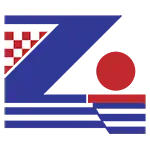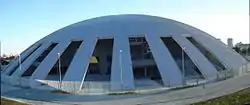KK Zadar
Košarkaški klub Zadar (English: Zadar Basketball Club), commonly referred to as KK Zadar or simply Zadar, is a men's professional basketball club based in Zadar, Croatia. The club is a founding member and shareholder of the Adriatic Basketball Association,[1] and competes in the ABA League and the Croatian League.
| Zadar | |||
|---|---|---|---|
 | |||
| Leagues | ABA League Croatian League | ||
| Founded | 1945; 75 years ago | ||
| History | KK Zadar (1945–present) | ||
| Arena | Krešimir Ćosić Hall | ||
| Capacity | 7,997 | ||
| Location | Zadar, Croatia | ||
| Team colors | White and Blue | ||
| President | Ivan Mijolović | ||
| General manager | Željko Žilavec | ||
| Head coach | Veljko Mršić | ||
| Championships | 6 Yugoslav Championships 1 Yugoslav Cup 2 Croatian Championships 7 Croatian Cups 1 Adriatic League | ||
| Website | kkzadar.hr | ||
|
| |||
Zadar is the place where Croatian basketball was born in 1930. Zadar's reputation has been of a basketball hotbed with a team that can capture trophies at any given moment. Zadar is also known for its fanatical die hard supporters, Tornado Zadar.
History
Early years
The first basketball ball and game rules of basketball were brought to Zadar by Italian soldiers during World War II. At that time all basketball games being played in Zadar were played on an outdoor, concrete court. KK Zadar was formally founded after World War II in 1945 as FD Zadar (Fiskulturno Društvo Zadar – Physical Culture Club of Zadar). Shortly after this club's founding, its basketball section went independent and became what is today's KK Zadar. Giuseppe "Pino" Giergia played his first game for Zadar in 1945; he later became one of the club's most famous players.
The 1949, KK Zadar entered Yugoslavia's first basketball division, remaining there until the country's break-up in 1990.
1960–1970
On November 28, 1964, Krešimir Ćosić played his first game for Zadar, while being only 16 years old.
In 1965 KK Zadar won a Yugoslav League national championship. They again became champions in 1967 and 1968. In that championship year, Kreso Cosic often knew to score even a 60 points per game. The club's new arena, Jazine, was built in 1968 in only 70 days. Also in 1966, Zadar played in the Euroleague final four; they were beaten in the semi finals and ended the tournament in third place. In 1969 Krešo Ćosić left for the United States to play college basketball at Brigham Young University from 1971 to 1973.
1970–1980
In 1973, Zadar was almost relegated from the Yugoslav First Federal Basketball League. In this time of crisis, Kreso Cosic returned to the club and with 36-year-old Giuseppe "Pino" Giergia Zadar once again became Yugoslav Champions, only to repeat this success two years later.
In 1976 Giuseppe Pino Giergia retired and Krešo Ćosić left the club to fulfill his obligations toward the Yugoslav Army (At this time, conscription was mandatory). During that time club was in a very difficult situation and once again were close to relegation. The club was once again saved by Krešo Ćosić who, after his military service, became the coach of Bresto in Italy. While he was the coach of Bresto he played basketball games for KK Zadar and once again saved the club from relegation.
1980–1990
In the 1981–82 season another legendary Zadar play made his debut: Stojko Vranković. During that season club has made it to the semifinals of FIBA Korać Cup. They repeated this success the very next season. In 1986 another milestone for the club was achieved: the club got its first world record holder, Zdenko Babić, who has scored 144 points against Apoel from Cyprus in the FIBA Korać Cup.
Arijan Komazec made his debut for Zadar in 1986, and he, along with Stojko Vranković, would play a crucial role in the years to follow. After 11 years of waiting, Zadar won its sixth national championship in 1986. In the finals of that year, KK Zadar met Cibona, and in a historic and legendary match, Zadar beat Cibona by 111:110. They won the game after two overtimes and thanks to an excellent performance by Petar Popović who scored 35 points. In 1987 the club won fourth place in the FIBA European Champions Cup. In 1989 Krešo Ćosić and Giuseppe "Pino" Giergia took charge of the club.
1990–2000
Krešo Ćosić left the club in August 1990 because of a disagreement with the club leadership. Ćosić would never return to the club, and was soon diagnosed with cancer. He died shortly after, in 1995. In the first, newly founded, Croatian national championship, in the 1991–92 season, the club has played in the finals. That year club has also played in the Euroleague. They were the finalist of the national cup in the 1992–93 season.
In years to come the club began to stagnate in the national championship and in the European competitions. In 1996 with a new coach at the helm, Danijel Jusup, Zadar reached the playoffs of the national championship, where they lost to Cibona. They repeated this success the following year with Emilio Kovačić as Zadar's key player, yet Cibona won the title once again.
In 1998 Zadar won the Krešimir Ćosić Cup, Croatia's basketball cup competitions. Marko Popović, the son of Petar Popović made his debut in 1998 for Zadar at age 16. In the summer of the 1999 Arijan Komazec returned to Zadar from Olympiacos, and the club had also signed Dino Rađa from Panathinaikos. In the season 1999–2000 Zadar had won its 2nd Krešimir Ćosić cup and had played, once again, in the semifinals of national championship and Saporta cup. Dino Rađa and Arijan Komazec proved as crucial players for the success in that season.
2000–present
In the seasons of 2000–01, 2001–02 Zadar played in the playoffs of national championship twice and once in Krešimir Ćosić Cup, yet they didn't win any of the possible 3 titles. In the season of 2002–03 Danijel Jusup returned to the club as head coach. During that season, with Marko Popović as a lead player, Zadar won its third Krešimir Ćosić Cup, as well as the newly established regional ABA League, founded on the ashes of the Yugoslav league and containing the best teams from the former Yugoslav republics. Zadar beat Maccabi Elite Tel Aviv in the final.
In the summer of 2003, Marko Popović left Zadar as Emilo Kovačić returned. Going into the ULEB Cup for a third season in 2004–05, Zadar once again missed the playoffs by a single win. In the season of 2004–05 Zadar finally won the Croatian national championship, after a 19-year wait. That season Zadar has also won their fourth Krešimir Ćosić Cup in a truly historical season. In 2006, they repeated their success from previous season in the Krešimir Ćosić Cup winning their fifth cup. Zadar returned to the national league final in each of the last two seasons, but KK Cibona stood on its way to another league title.
In 2008, Zadar became the Croatian champion for the second time, beating KK Split 3–2 in the best of 5 series. The final game of the series, which Zadar won 89 to 65, was the last game ever played at Jazine, affectionately called "The Temple of Croatian Basketball" by many fans and basketball aficionados.
Domestic league and cup winning rosters
- 1964–65: Vladimir Ćubrić, Đuro Stipčević, Miljenko Valčić, Marko Ostarčević, Bruno Marcelić, Jure Košta, Josip Đerđa, Petar Anić, Petar Jelić, Mile Marcelić, Krešimir Ćosić, Željko Troskot, Milan Komazec. Coach: Enzo Sovitti.
- 1966–67: Josip Đerđa, Krešimir Ćosić, Coach: Đorđo Zdrilić.
- 1968–69: Valčić, Stipčević, Laura, Komazec, Troskot, Košta, Giergia, Ćosić, G. Brajković, Bruno Marcelić, Mile Marcelić. Coach: Đorđo Zdrilić.
- Cup 1970: Vlado Vanjak, Đuro Stipčević, Goran Brajković, Bruno Marcelić, Milan Komazec, Pino Giergia, Vlado Gruškovnjak, Krešimir Ćosić, Nedjeljko-Mišo Ostarčević, Nikola Olujić, Petar Jelić. Coach: Trpimir Lokin.[2]
- 1973–74: Branko Bakija, Jure Fabijanić, Bruno Marcelić, Čedomir Perinčić, Branko Skroče, Pino Giergia, Krešimir Ćosić, Zdravko Jerak and Tomislav Matulović. Coach: Lucijan Valčić
- 1974–75: Čedomir Perinčić, Jure Fabijanić, Boris Babić, Branko Bakija, Bruno Marcelić, Branko Šuljak, Pino Giergia, Krešimir Ćosić, Zdravko Jerak, Darko Fabulić, Nedjeljko Ostarčević, Tomislav Matulović, Branko Skroče, Josip-Pino Grdović, Bruno Petani, Žarko Bjedov. Coach: Lucijan Valčić, Trpimir Lokin, Leonard Bajlo.
- 1985–86: Darko Pahlić, Petar Popović, Milan Mlađan, Ante Matulović, Zdenko Babić, Dražen Blažević, Stojko Vranković, Veljko Petranović, Ivica Obad, Boris Hrabrov, Drago Čiklić i Arijan Komazec. Coach: Vlade Đurović[3]
Honours
Total titles: 16
Domestic competitions
- Winners (2): 2004–05, 2007–08
- Runners-up (11): 1991–92, 1997–98, 1998–99, 1999–00, 2001–02, 2003–04, 2005–06, 2006–07, 2008–09, 2009–10, 2012–13
- Winners (7): 1997–98, 1999–00, 2002–03, 2004–05, 2005–06, 2006–07, 2019–20
- Runners-up (7): 1992–93, 2000–01, 2001–02, 2003–04, 2010–11, 2014–15, 2015–16
- Yugoslav League (defunct)
- Yugoslav Cup (defunct)
- Winners (1): 1969–70
European competitions
- FIBA Saporta Cup (defunct)
- Semifinalists (1): 1999–00
- FIBA Korać Cup (defunct)
Top performances in European & worldwide competitions
| Season | Achievement | Notes | |
|---|---|---|---|
| EuroLeague | |||
| 1965–66 | Quarter-finals | 4th place in a group with CSKA Moscow, AEK and CSKA Cherveno zname | |
| 1967–68 | Semi-finals | eliminated by Real Madrid, 62-76 (L) in Madrid and 65-68 (L) in Zadar | |
| 1968–69 | Quarter-finals | 3rd place in a group with Real Madrid, CSKA Moscow and Academic | |
| 1974–75 | Semi-finals | eliminated by Real Madrid, 82-109 (L) in Madrid and 117-130 (L) in Zadar | |
| 1975–76 | Quarter-finals | 6th place in a group with Mobilgirgi Varese, ASVEL, Maes Pils, Academic & Turun NMKY | |
| 1986–87 | Semi-final group stage | 4th place in a group with Tracer Milano, Maccabi Elite Tel Aviv, Orthez, Žalgiris & Real Madrid | |
| FIBA Saporta Cup | |||
| 1970–71 | Quarter-finals | eliminated by Spartak Leningrad, 59-63 (L) in Zadar and 78-98 (L) in Leningrad | |
| 1979–80 | Quarter-finals | 3rd place in a group with Emerson Varese, FC Barcelona and Eczacıbaşı | |
| 1993–94 | Quarter-finals | 5th place in a group with Pitch Cholet, Sato Aris, Hapoel Galil Elyon, Overense Aerosoles & Levski Sofia | |
| 1999–00 | Semi-finals | eliminated by AEK, 75-70 (W) in Zadar and 67-82 (L) in Athens | |
| FIBA Korać Cup | |||
| 1981–82 | Semi-finals | eliminated by Limoges CSP, 92-84 (W) in Zadar and 78-99 (L) in Limoges | |
| 1982–83 | Semi-finals | eliminated by Šibenka, 78-70 (W) in Zadar and 69-89 (L) in Šibenik | |
| 1988–89 | Semi-finals | eliminated by Partizan, 63-75 (L) in Belgrade and 84-88 (L) in Zadar | |
| 1990–91 | Quarter-finals | eliminated by Mulhouse, 84-84 (D) in Zadar and 67-80 (L) in Mulhouse | |
| 1991–92 | Quarter-finals | eliminated by Fórum Filatélico Valladolid, 80-95 (L) in Trieste and 91-83 (W) in Valladolid[4] | |
| EuroCup | |||
| 2002–03 | Quarter-finals | eliminated by Pamesa Valencia, 84-105 (L) in Valencia and 93-80 (W) in Zadar | |
| 2008–09 | Quarter-finals | eliminated by Iurbentia Bilbao, 67–76 in Torino | |
| Adriatic League | |||
| 2002–03 | Champions | defeated Maccabi Elite Tel Aviv, 91–88 in the final of the Adriatic League in Ljubljana | |
Season by season
In Yugoslavia
In Croatia
Home courts
PlayersCurrent rosterNote: Flags indicate national team eligibility at FIBA sanctioned events. Players may hold other non-FIBA nationality not displayed.
Depth chart
Notable playersNote: Flags indicate national team eligibility at FIBA sanctioned events. Players may hold other non-FIBA nationality not displayed.
Head coaches
Members of the Basketball Hall of FameNotes
References
External links
| ||||||||||||||||||||||||||||||||||||||||||||||||||||||||||||||||||||||||||||||||||||||||||||||||||||||||||||||||||||||||||||||||||||||||||||||||||||||||||||||||||||||||||||||||||||||||||||||||||||||||||||||||||||||||||||||||||||||||||||||||||||||||||||||||||||||||||||||||||||||||||||||||||||||||||||||||||||||||||||||||||||||||||||||||||||||||||||||||||||||||||||||||||||
